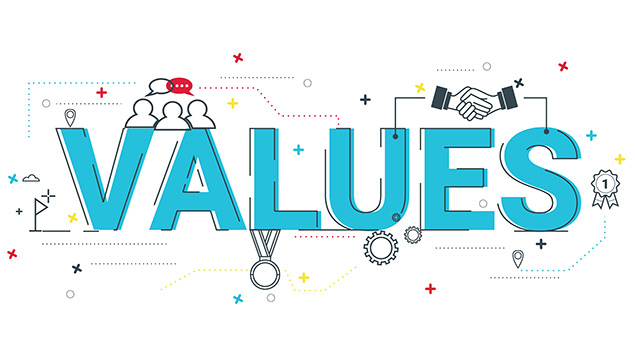The absence of formalized values in an organization – or the absence of accountability for published values – can be interpreted to mean that any path – including lying, cheating, or stealing – is OK.
Consider this: You don’t “assume” that everyone in your organization knows their performance standards and delivers them without any discussions, do you? Performance clarity and accountability require formalized goals and targets, with dashboards and metrics monitored closely, every day.
In the same way, you must not “assume” that everyone in your organization knows how you want them to treat other people at work, either. Values clarity and accountability require formalized values and behaviors, with interaction quality monitored closely, every day.
To ensure citizenship is as important as performance, you need a values operating system – a VOS – in the form of an organizational constitution that is lived and demonstrated by everyone in your organization daily.
An organizational constitution is a formal statement of your company’s:
- service purpose
- values and behaviors
- strategies
- goals
This statement defines what contributions are needed and what citizenship is needed from every player, every day.
Every organization has values, just as every human has values. Some organizations have values that encourage an “I win, you lose” dynamic. Some embrace a “service to others” environment. Some emphasize “results, results, results” while others embrace a family and teamwork dynamic.
We see a wide range of values demonstrated in organizations, large and small, around the globe. Values are the foundation of an organization’s culture – for better or worse.
The challenge is that most leaders – senior executives, directors, small business owners, team leaders, regional heads, etc. – do not pay attention to the health and quality of their organization’s culture.
They’ve never been asked to do that. They may not know how. The vital metrics that leaders are typically held accountable for are performance metrics. It is rare for leaders to be held accountable for the quality of their work environment or for happy, engaged employees.
Yet where employees are happy – treated with trust, respect, and dignity in every interaction – productivity grows.
For example, Parnassus Investments’ Workplace Fund – a mutual fund that invests in large American firms with outstanding workplace cultures – outperformed the S&P Index during the recent global recession with a 10.81% return compared to the S&P’s 3.97% return!
Focusing exclusively on results or profits can be a slippery slope, as Volkswagen and the Turing Pharmaceuticals discovered. What is fascinating is that both of these organizations have published formalized values. Volkswagen’s values specifically note, “environmental protection.” Turing Pharmaceuticals’ code of conduct specifically notes, “treating each other and customers and patients with the respect they deserve.”
In Volkswagen’s case, the behavior of engineers to install software to cheat on emissions testing is clearly in violation of their values. In Turing Pharmaceuticals’ case, the code of conduct document is dated January 27, 2016. I cannot find references to a code of conduct in the company previous to that date. It seems that their pricing debacle prompted the creation of this code.
Most organizations have strategies and goals defined; these represent your company’s performance standards and expectations. Very few have values defined in observable, tangible, measurable terms – which is the only way you can build a values operating system in your organization.
Crafting and communicating your VOS – through your organizational constitution – is the easy part. The more complex part is aligning all plans, decisions, and actions to your VOS.
When employees are treated with trust, respect, and dignity in every interaction, they’ll treat your customers like gold. They’ll proactively solve problems. They’ll demonstrate pride in their work. And – they’ll deliver performance gains of 30 percent or more.
What values does your organization hold dear? Don’t wait. Formalize your values operating system with an organizational constitution and align behavior to it every day.


